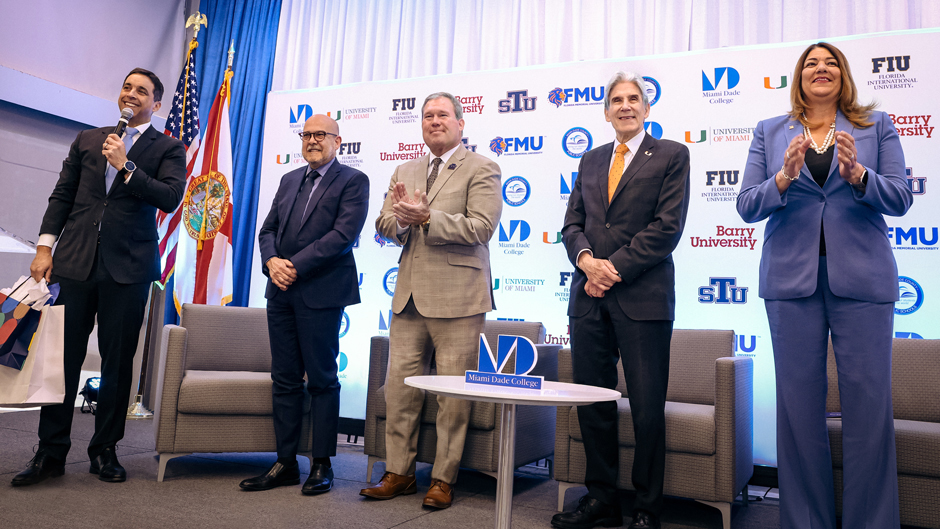From cloud computing specialists to social media managers, many of the jobs that are now ubiquitous in today’s workforce didn’t exist only a few years ago, University of Miami President Julio Frenk told a group of local educators, entrepreneurs, and citizens on Thursday.
And as innovation continues to increase, he explained, new careers will only continue to emerge, creating the “most dynamic labor market” college students will ever face.
Frenk’s comments were part of “The Class of 2040: Building Miami’s Next-Generation Workforce,” an hour-long panel that featured the presidents of Greater Miami’s six major colleges and universities and the superintendent of Miami-Dade County Public Schools.
Collectively, the seven make up the Miami-Dade Beacon Council’s Academic Leaders Council (ALC), and during Thursday’s event, held on Miami Dade College’s Wolfson campus, they discussed the challenges that confront students and the results of their newly released report outlining goals to develop labor force talent throughout the county.
“Almost by definition, [students] cannot, while they’re in school, learn everything that’s going to serve them in the labor market because the labor market is rapidly changing,” said Frenk, noting his university’s “education for life” strategy and encouraging other institutions to follow a similar blueprint. “We need to become providers of educational services not only before students go into the labor market but also during their entire journey.”
Developing workforce talent through strong educational efforts is crucial, the panelists agreed, and, in some respects, just as important as addressing the climate crisis.
“It is through the power of education that we unlock opportunities for our community,” said Madeline Pumariega, Miami Dade College President and ALC chair. “It is about ensuring that we align the production and pathways so our community has a talent goal, so that we can unlock the opportunities for our youth and for people who come every day to Miami-Dade County.”
Those who visit Miami-Dade County will find one of the nation’s most diverse metropolitan areas, panelists pointed out. More than half of its residents were born outside the U.S., and more than eight in 10 identify as Hispanic or Black, setting the stage for colleges, universities, and secondary schools “to build a uniquely diverse, skilled workforce unlike any regional workforce in the hemisphere,” said Matt Haggman, executive vice president of the Beacon Council’s Opportunity Miami initiative, which sponsored the event.
To help develop the talent that will comprise that workforce, the ALC, in its “Miami-Dade County 2040 Talent Development Goals” report, states that it will endeavor to increase the percentage of adults in the county with an associate degree or higher from 45.5 percent to 65 percent by 2040.
That benchmark is important because it “directly correlates to income and prosperity,” states the ALC report, noting a Florida College Access Network statistic that says those who hold an average associate degree earn more than $70,000 annually in comparison to $35,400 for those with only a high school diploma.
“That means millions of dollars in lifetime earnings for our residents. So, we absolutely must get to those higher levels,” said Florida International University President Kenneth A. Jessell.
While that number of residents in Miami-Dade with an associate degree has increased by 8.2 percent since 2009, “the truth is we’re still behind,” Haggman said. He pointed out metropolitan areas with higher percentages such as Atlanta (50.9 percent), Boston (60.8 percent), and San Francisco (61.3 percent).
During the panel discussion, Frenk said it is important that business leaders and higher education institutions work together to reach the goal of ramping up workforce talent.
“We’re part of the same ecosystem, the same society that’s facing huge challenges but also enormous opportunities,” Frenk said. “As universities, we interact with entrepreneurs and business leaders that create jobs and prosperity at two points that are critical. We do research that increases our understanding of the world around us and, at its best, leads to innovation that businesses then take up to produce solutions for society’s challenges.”
In other highlights of the panel discussion:
- St. Thomas University President David A. Armstrong said that students can get an even bigger “leg up” in the job market by adding certifications in areas such as business, health care, and project management to their advanced degrees.
- Jaffus Hardrick, president of Florida Memorial University, said “education is a great equalizer” that can help alleviate poverty. “Therefore, we have a responsibility to make sure we’re creating opportunities for those individuals that come back, get their degrees, and get the right certifications to improve themselves,” he said.
- Barry University President Mike Allen commented on the importance of technology education. “When I think about partnerships, I think about students who are starting with us right now. They’ll graduate in four years. But we don’t know what AI is going to look like in four weeks,” he said. “The only way we prepare students and meet the talent demands of South Florida is by working with corporate partners, by listening in ways perhaps that we haven’t in the past, by literally making our universities almost virtual annexes of tech companies to hear what they need, to hear the skills and understand the skills that they need from our graduates.”
- Connecting students to colleges and universities before they graduate high school can also help improve Miami-Dade’s workforce, said Jose L. Dotres, superintendent of Miami-Dade County Public Schools, the third-largest school district in the nation. “I want to make sure that our students just don’t finish high school and then start venturing into their journey into college. It must start much earlier where we begin to make connections,” he said. “The interconnectedness we must have with the colleges, from the get-go, are important. We’re doing more dual enrollments than ever before, and I’m glad to say that we have partnerships with every single university here.”

